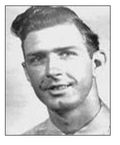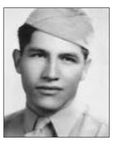War Stories II (63 page)
Authors: Oliver L. North

The mission began at 0500 on 28 January 1945. Before the Rangers started out, fourteen Alamo Scouts and a band of some 200 Filipino guerrillasâwho had been keeping track of enemy positions and troop movementsârendezvoused with the Rangers.
Captain Juan Pajota, the brilliant Filipino resistance leader, knew every square inch of the land and its dangers. Drawing diagrams in the dirt, Captain Bob Prince and Lt. Colonel Mucci rehearsed the plan with their officers and non-coms over and over again. The element of surprise was the key, and it was all set for the night of 29 January.
But last minute intel indicated that the Japanese were going to be on the move: Hundreds of trucks, tanks, armored vehicles, and troops would be right outside the prison camp. The enemy troops were on the retreat, and the Americans feared that before the Japanese left Cabanatuan they would carry out Tokyo's order to kill all the prisoners.
Still, despite their intentions to get to Cabanatuan right away, trying to undertake the raid that night would be a meaningless suicide mission. Mucci took the matter upstairs and was given a twenty-four-hour delay for the Rangers. They would just have to pray that since the Japanese were on the move, they wouldn't take the time or initiative to kill the prisoners before the Rangers got to them. The more likely scenario was that the prison commandant and guards would be assigned that responsibility, and that the Rangers would get to Cabanatuan in time to stop it.
Mucci and the Rangers began their trek to the prison camp with Captain Prince and a handful of Rangers bringing up the rear. They knew it would be an arduous mission. They spent the night at Balincarin, barely avoiding detection by the Japanese. The second night they reached the village of Platero, not far from the prison camp. The last major physical obstacle was the Pampanga River. The Americans held their weapons above their heads and half-waded, half-swam the river, hoping that all 121 of the Rangers would get across safely without being seen.
Now came the tricky part. From the nearby barrio of Plateroâwhere the Rangers were hidden during the day by friendly Filipinosâand for the rest of the way to the prison camp itself, the Rangers had to crawl on their
bellies to avoid detection by the Japanese. The land itself was unforgiving during this part of their efforts; the ground was barren and offered practically no cover. So the Rangers crawled, cradling their rifles, measuring their distance in inches, and as they wriggled across through the tall grass, time seemed to stop.
bellies to avoid detection by the Japanese. The land itself was unforgiving during this part of their efforts; the ground was barren and offered practically no cover. So the Rangers crawled, cradling their rifles, measuring their distance in inches, and as they wriggled across through the tall grass, time seemed to stop.
Then the Rangers could see the guard towers of the prison camp, and sometime later they were in sight of the barbed-wire fences. But the gaze of the watchtower guards covered the very area from which the Rangers were approaching the camp.
Lt. Colonel Mucci was hoping that they wouldn't have to wait long for the diversion that he'd ordered, code-named “Black Widow.” It happened within a minute or two of the planâat about 1940 hours.
An American P-61 suddenly appeared in the skies near the prison camp, opposite the side where the Rangers approached. The pilot swooped in at 200 feet above the compound and zoomed past, making a few high loops. Then he cut an engine and restarted it, causing a loud backfire, the actions designed to alert whatever guards hadn't sighted the plane initially. The P-61 made a few more noisy passes in the sky, just out of machine gun range, making certain that the Japanese knew that he was thereâand distracting them from the fact that the Rangers were there, too.
The diversion worked perfectly. While everyone looked up at the American P-61, two Rangers ran up, shot and killed the gate guard, blew the lock off the front gate to the prison compound, and then threw open the gates. Simultaneously, C Company Rangers raced down the “main street” of the POW compound. Their weapons blazing, they took out Japanese guards with a merciless barrage of automatic fire. Another unit of the Rangers had surrounded the prison camp to prevent any Japanese inside from escaping or going for help.
The POWs heard the massive amount of gunfire and assumed it was the end. They heard rumors that the Japanese were on the move, and didn't recognize the uniforms of the Rangers, so they feared the worstâthat these were enemy troops come to kill them. The prisoners were reluctant to come out of hidingâwhich probably saved them from getting caught in the crossfire.
The POWs crouched in ditches and under the shacks; they hid wherever they could. They couldn't believe that this was really a prison breakâthese were actually Americans. They thought it was a trick to lure the prisoners out so they could all be gunned down. It took some persuading on the part of the Rangers to get them to move toward the main gate.
While Krueger and Mucci were considering ideas and options, American soldiers John Cook and Ralph Rodriguez, Jr., Bataan Death March survivors and prisoners in the Cabanatuan POW camp, couldn't believe that this was the hour of their liberation.

PRIVATE JOHN COOK, US ARMY
Camp Cabanatuan
Luzon, Philippine Islands
30 January 1945
Camp Cabanatuan
Luzon, Philippine Islands
30 January 1945

I was sitting outside and leaned against the side of the mess hall. There were 512 of us in this place.
The Rangers cut the fence beneath the nearby Japanese guardhouse. Lieutenant Richardson fired the first shot, after which all hell broke loose.
The Rangers came up the road into camp from the outside, on the gravel road coming into camp. They had to get past quite a few Japanese there. They also had to deal with the guard tower.
We didn't know what was happening. The first guy that burst into our quarters said, “Let's go. You're free!” I didn't recognize the uniform. He had a funny cap on, and a green uniform. And he kept yelling, “Let's go! Get out the main gate!”
I said, “Who in the hell are you?”
He said, “We're Yanks!”
They wanted to put me on an oxcart, but I said, “Like hell! I walked into that damn place. I'll walk out!”
I ran to the Pampanga River through the rice fields with them and I asked, “How deep is the water? I can't swim.” And someone said, “It's
waist-deep. Get your butt in here and get across there. Don't you hear the Jap tanks coming?”
waist-deep. Get your butt in here and get across there. Don't you hear the Jap tanks coming?”
From that moment on, I kept walking, all night long. And the next morning we were at the American lines.

CORPORAL RALPH RODRIGUEZ, JR., US ARMY
Camp Cabanatuan
Luzon, Philippine Islands
30 January 1945
Camp Cabanatuan
Luzon, Philippine Islands
30 January 1945

Every evening, about seven o'clock, I'd type out my diary.
I started typing what I saw to the west of our camp; there were some flares way out there in the distance, and I'd been watching them, typing in the diary about the flares getting closer.
So, this night, I finished the typing the account and something about the new Japanese soldiers coming in and the other ones leaving. That was my last page, and I pulled it out from the typewriter. I had already written a lot but I wouldn't put my name on it. The Japanese warned us that anybody caught with a diary would be shot.
I'd been hiding it for years and couldn't allow it to be found. That's how I had the diary that night we were rescued.
About twenty minutes later, when I'd put my diary away, suddenly, it was the time that somebody had to ring the time. Someone came out and instead of hitting the time bell in pairs (you know, ding-ding, ding-ding), he came in there and he hit it hard, fifteen times, as loud as he could.
Well, for the last hour, there had been Rangers at the end of the building, hiding in a ditch but none of us saw them.
The other Rangers thought that somebody had been discovered. So they started shooting the Japs and I saw two Japs fall off the guardhouse.
And then, at the guardhouse, they dropped three hand grenades inside and that's how it started.
I got shot at there but they hit a pipe, so I turned and kept on going. By this time, I'm the last man, or next to the last man, to leave the camp. And then suddenly I saw a shadow and heard somebody yell, “Any more Americans?” And these guys were big guys. They had cartridge belts draped over their shoulders and one or two handguns. And I don't know what else.
I was afraid to say, “Here I am!” But this guy says, “Well, get out of here!” Then he jerked me up and I stood up, and I walked out. So that's how I got introduced to the liberators.
 6TH RANGER BATTALION
6TH RANGER BATTALIONPOW CAMP
CABANATUAN, LUZON
30 JANUARY 1945
CABANATUAN, LUZON
30 JANUARY 1945
The whole thing was all over in twenty minutes. There were 225 Japanese dead, while the Rangers suffered just two casualties. They rounded up the American POWs and tried to organize them into a military formation and complete the rescue by getting them back to friendly territory quickly and safely.
Before the Rangers had left on the mission, Captain Juan Pajota had suggested using caribou, ancient beasts of burden in the Philippines, to help move the weakened prisoners. So now, old wooden-wheeled oxcarts were waiting when the Rangers got the prisoners out of the POW camp and across the river.
Other books
Sword Play by Emery, Clayton
Forged by Desire by Bec McMaster
The Craving (Rogues of Scotland #1) by Donna Grant
Shades of Grey by Jasper Fforde
The Borgia Dagger by Franklin W. Dixon
The Woman Who Married a Bear by John Straley
The Great Betrayal by Michael G. Thomas
Wolf Creek by Ford Fargo
Framed in Blood by Brett Halliday
The Possibility of Trey by J.A. Hornbuckle
